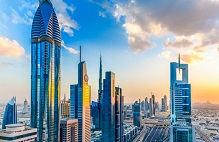Invesco’s 2014 Middle East Asset Management survey revealed that the UAE saw total private capital inflows of 81% compared to 52% in 2013, with political stability dominating inflows from emerging markets.
Among the most notable inflows have been those coming from Russia and the surrounding Commonwealth of Independent States, which have risen to 17% of total inflows from 10% in 2013, as a result of the Crimean crisis.
“Whilst the Arab Spring saw expatriate assets and invests moving into the UAE, Russian investors have not relocated and can more easily withdraw their UAE assets at short notice,” said Nick Tolchard, head of Invesco Middle East. “Our study shows that political stability is a hugely important factor in driving the direction of private capital flow, and the UAE is clearly considered a ‘safe haven’ amidst geopolitical upheavals in the region and beyond.”
“Long term, structural trend”
Inflows from Africa have also risen, reaching 9% from 3% in 2013, with Tolchard putting this down to the UAE’s “ideal” geographic positioning between Africa and Asia.
“We have found that many banks are rapidly building their African divisions and assets under management, and, importantly, and in contrast to Russian assets, UAE intermediaries saw African private capital inflows as a longer term, more structural, trend.”
Despite geopolitics generating significant inflows, the survey also found that local investment opportunities have soared over the last year to become the most frequently cited driver of total private capital flow, with 33% of respondents identifying local openings as the most important factor driving their capital, up from 29%.
Tolchard said the fact that many respondents attributed capital inflows to local investment opportunities shows that the UAE is becoming an “increasingly attractive investment destination in its own right”.
There has also been a small shift in outflow destinations across the Gulf, with 5% of assets leaving the UAE allocated to Singapore compared to 1% in 2013, and assets moving to Switzerland falling from 10% in 2013 to 4% this year.
Commenting on the shift from Switzerland towards Singapore, Tolchard said that, while the change is still small, it is indicative of shifting international capital flows and the growing significance of financial centres outside of the Western world.
Overall, the strength of opinion on the UAE and Dubai’s position as a hub for private capital flow was stronger this year, with a positive net respondent view of 81% in 2014 compared to 52% in 2013.
The study also found dissimilitude across investors in the region, with non-resident Indians (NRIs) targeting an average of 10.6% return throughout the year, while GCC locals and Western expats aimed for 9.6% and 7% respectively.
NRIs said the main factor driving their expectations was benchmarking returns against Indian market rates, while GCC locals cited local stock markets, and Western expats identified global equity markets.
Last year’s survey revealed the average investor time horizon in the Middle East had increased from five to six years.
The study also found significant changes for NRIs, with their average investment time horizon jumping from 3.5 years in 2012 to 5.9 years.




